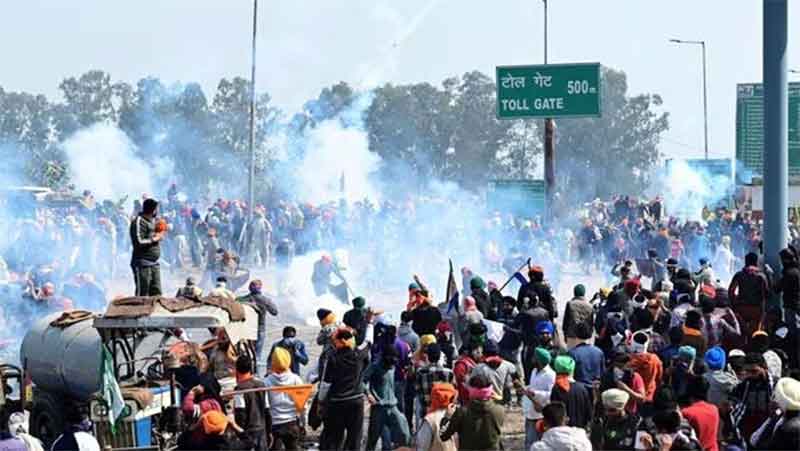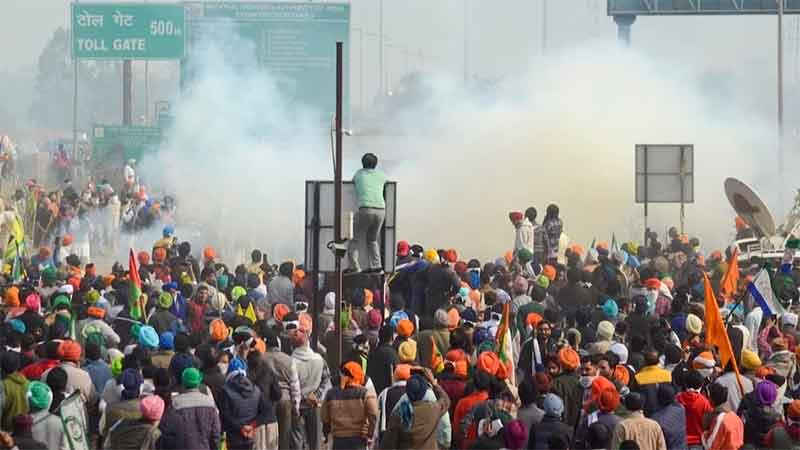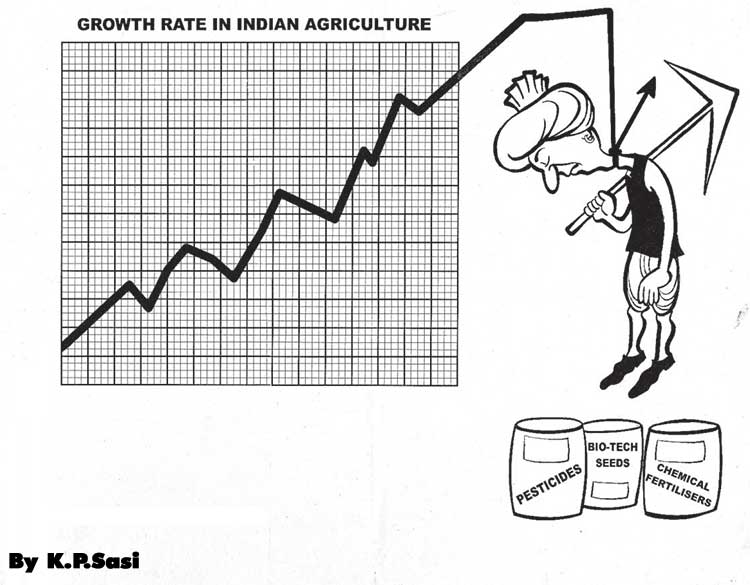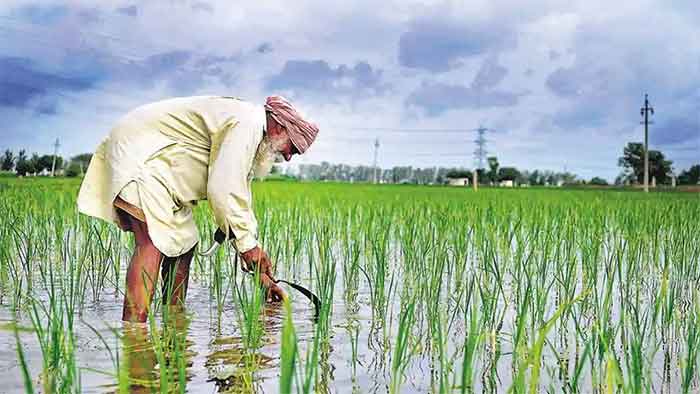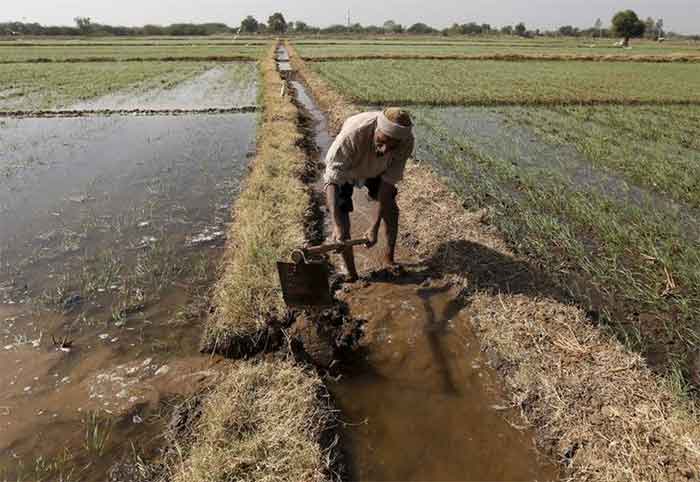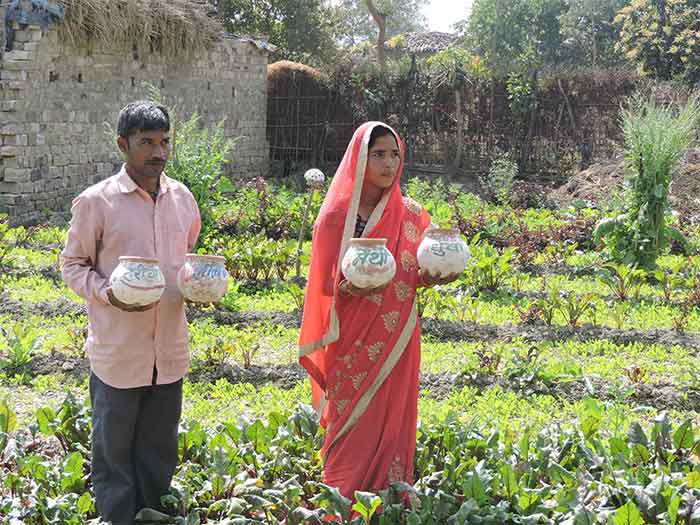
In these dark times, the sun is shining on one thing: i.e. a powerful peasant movement in India led by the left! The successful peasant movement against the current right-wing government’s anti-farmer laws (and other anti-people policies) has rightly caught the global attention. Many left peasant organizations, including AIKS (All India Kisan Sabha), have been a part of the leadership of the movement. Peasants are also fighting against the forcible acquisition of land by the state in corporate’s interest without proper and timely compensation.
Those who accuse peasants and other protestors as andolana jeevi, or even as anti-nationals, etc. should know that: there is a reason for the struggles of the workers and peasants who constitute the real nation. The reason is the anti-national attacks on their life and livelihood. The ruling class and its political representatives appear to be oblivious of the fact that: farm income, whether in the rubber cultivation or the cultivation of cereals or vegetables, is absolutely insufficient to meet the cost of production and household expenses, which is why more than 2000 farmers give up cultivation every day, and possibly a farmer commits suicide every half an hour or so (at least between 1995 and 2015).
Peasants, like workers, are not just a suffering mass. Like workers, they are a fighting mass. They make many immediate demands. For peasants to increase their success in getting these met, there must be a worker peasant alliance (WPA). The process of its formation has begun.
CAPITALISM AS THE BASIS FOR WORKER PEASANT ALLIANCE
And the basis for WPA must consciously be capitalism. Let me explain. India is dominantly a capitalist country in the sense of what Marx calls formal subsumption of labour, which is to say that capitalism exists where the following conditions exist: surplus is pumped out mainly via economic, and not extra-economic, coercion, from nominally free labour; the means of production and consumption are bought in the market (both by capital and labour) thus confront the worker as capital; no more labor time is used in production than is socially necessary, so there is competition to reduce the cost of production of commodities for sale; and an economic relation of supremacy and subordination exists at the point of production, as the worker is supervised by the capitalist (or their manager) (I discuss this in details in my book, Critical reflections on economy and politics in India). Indian capitalism is dominantly based on a regime of low wages and long hours, which is combined with elements of advanced capitalism (especially in the monopoly sector) and with remnants of pre-capitalist relations in specific localities. Peasants are a big part of Indian capitalism as are workers.
The main contradiction in Indian society is not between landlordism and the masses but between capitalism, including its many factions on the one hand and the masses – rural and urban proletarians/semi-proletarians and working peasantry, the masses who are also oppressed/exploited by remnants of semi-feudal relations in specific localities which capital will not eliminate because of its fear of the working class. Further, India’s capitalism has been working as a junior partner of imperialism which, through its financial and other institutions, adversely impacts both workers and peasants.
It is capitalism that is adversely affecting both workers and peasants. Capitalists engage in M-C-M′: investing money to buy commodities and hire labour to produce commodities for sale for money than invested, and their profit ultimately comes from them paying less than what workers produce in net terms. Capitalists’ involvement in this circuit – including their strategies of procuring money for investment and for buying, at a cheaper rate, means of production (including agro-raw materials, land, water, etc.) and labour power—affects both workers and peasants. In contrast, most peasants engage in M-C-M– : this means that: they invest money to produce farm products for sale for more money but end up making less money than invested (i.e. M–). As Lenin has said: ‘Capital, created by the labour of the worker, crushes the worker, ruining small proprietors and creating an army of unemployed’.
Capitalism is impacting workers and peasants in many ways. These include: low wage and un- and under-employment in cities which hurt urban workers, a situation that stops many peasants from switching to urban labour; state-enforced acquisition of peasants’ land in corporates’ interests without their explicit consent; adverse terms of trade against peasant farming favoring urban capital; inflation caused by corporate price gouging; neoliberal austerity to increase corporate profit and discipline workers; tightening grip of corporates over agriculture via marketing, finance, contract farming, etc.; retrenchment of state employees; rural capitalism’s increasing control over peasants and rural labour by the expansion of their activities into non-farm spheres; unfree labour relations including bonded labour; collaboration between urban capital and a new class of rural rentiers who own dormitories for workers in new industrial towns; increasing control over Indian economy by foreign companies and institutions; and so on.
There are also political attacks on workers and peasants from the institutions of the capitalist state. There are increasing attacks on democratic rights and rights of minorities, and this impacts workers and peasants. Peasants and workers are also treated undemocratically by state officials who behave as kings/queens or landlords. There are increasing attacks on democratic rights and rights of minorities, and this impacts workers and peasants. On-going attacks on federalism are also attacks on workers and peasants because their organizations are strong in certain states where they influence, or run, the governments.
WHAT MUST WORKER-PEASANT ALLIANCE DEMAND?
If it is capitalism that is the dominant reason for workers’ and peasant’s suffering, then it follows that: the fight for concessions from capitalism (immediate demands including for land) must consciously be a part of the fight against the logic of capitalism as such, i.e. the fight for socialism on the basis of non-immediate demands or transitional demands, the demands that bridge the gap between current level of consciousness/action and socialist consciousness/action, the demands that will help workers and peasant to form their government.
These transitional or radical demands of WPA must include: nationalization of big corporations, plantations and other major enterprises, especially those in heavy industry, transportation and communication, food and medicine, construction and energy; effective, not nominal, control over credit; expansion of public sector and of peasants- and workers-run cooperative sector, including in agri-production, fishery and agro-processing; saying no to austerity imposed in part by imperialism; government take-over of enterprises which were hitherto in the public sector; cancellation of debts owed to foreign institutions; right to work with inflation-adjusted wages; remunerative price to farmers to be multiple times the price currently received; farmers and workers’ access to high-quality food, shelter, healthcare, education, energy, transportation, etc. in adequate quantities; price control by committees of workers and peasants; democratization of the state, including the active participation of workers and peasants in administration; progressive taxation; immediate cessation of secretive corporate funding for parties; immediate stop to extravagant beautification and monument-building policies and excessive military spending that do not benefit workers and peasants; significant climate mitigation strategies without any compromise with polluting corporates; and so on. Needless to say, while making these demands, workers and peasants must remain independent of all bourgeois parties.
The peasantry’s class position is a barrier to the WPA’s fight for socialism, however. While peasants are dominantly exploited by capitalism, peasants qua peasants, unlike workers, generally do not have socialist instinct because of their proprietorship.
Therefore their socialist education would be vital. Indeed: it is the task of socialist political economy, says Lenin (in 1908), ‘to demonstrate to the small producer the impossibility of [their] holding [their] own under capitalism, the hopelessness of peasant farming under capitalism, and the necessity for the peasant to adopt the standpoint of the proletarian’.
It is true that ‘the fight for socialism [as] a fight against the rule of capital… is being carried on first and foremost by the wage-workers’ (Lenin in 1905). But there are no absolutely insurmountable barrier to millions of working peasants, if not all, being their socialist ally: ‘As for the small farmers, some of them own capital themselves, and often themselves exploit workers. Hence not all small peasants join the ranks of fighters for socialism’ (Lenin, 1905). But some can and do join the fight for socialism: ‘only those do so who resolutely and consciously side with the workers against capital, with public property against private property (ibid; italics). As peasants experience proletarianization, objective conditions will be created for their adoption of the proletarian socialist attitude.
That socialist tendency will be stronger if peasants are educated about the fact that socialism is not a threat to their control over land. Socialists do not need to expropriate small peasantry. Whether they remain individual peasants or become members of peasant coops, they will receive not only land and credit but also machines and fertilizers, etc. at an affordable price. And, because of the attacks on capitalist property, and especially, large-scale capitalist enterprises by the worker peasant government, wages will rise drastically (say by 3 times) and state welfare will expand massively, and workplace alienation will be reduced enormously, and when this happens, many middle peasants and those who hire some labour may voluntarily switch to (peasants-operated) cooperative production or to socialist labour.
In a socialist society, Lenin writes in a 1917 article titled ‘Alliance Between the Workers and Exploited Peasants’: ‘there is no radical divergence of interests between the wage-workers and the working and exploited peasants. Socialism is fully able to meet the interests of both. Only socialism can meet their interests. Hence the possibility and necessity for an “honest coalition” between the proletarians and the working and exploited peasantry’.
Lenin’s words about the need for WPA to be socialist and explicitly anti-capitalist have contemporary relevance. Just as the Russian peasants fought for freedom from illiberalism and for land, so must peasants in India and other countries of belated capitalist development, as a part of their uninterrupted fight for socialism. After all, as Lenin said in 1921 in his ‘Fourth Anniversary of the October Revolution’: ‘reforms are a by-product of the revolutionary class struggle’ i.e. ‘a ‘by-product’ of our main and genuinely proletarian-revolutionary, socialist activities’. It is the fire of the socialist imagination that will increase three aspects of the peasant and workers movement and of WPA: extensity (geographical spread); intensity (the extent to which their movement forces governments to concede to their demands or loses legitimacy) and velocity (speed of action).
If the main class process that is impacting peasants is capitalism, then it is wrong to say that the slogan of a socialist nature vis-a-vis agriculture, if raised now, will hinder the task of winning over the peasantry. The idea that workers and peasants will achieve some kind of egalitarian democratic capitalism first and will then engage in a socialist struggle at some future date, is a restrictive vision that can wrongly determine the allies. The idea that the conditions for socialist movement are not ripe now is based on the idea that capitalist relations, better managed by a popular-democratic government, can further the development of productive forces: such a view forgets that capital – as a social relation — has become a barrier to itself. To say that the completion of the democratic task of the revolution is the most urgent task because it will help clear all the pre-capitalist relations and institutions is to overestimate pre-capitalism’s impact on peasants and underestimating capitalism’s impacts, including its promotion of illiberalism.
Time is running out. Climate breakdown. Fascistic forces knocking on the door. Militarism. Workers and peasants experiencing avoidable death and illness. Imperialism after workers’ and peasants’ blood and sweat. So, socialism must not be talked about in future tense. In the Indian context, problems such as divisive politics of hate, massive immiserization, collapse of government-provided education and healthcare, unemployment and low wages, agrarian distress, climate change, and so on can only be fought by a politics of worker-peasant alliance.
A crisis-ridden capitalism-in-decline leaves no space for a more democratic, more egalitarian, less corporates-dominated, and more pro-peasants or pro-worker capitalism. The choice for workers and peasants today is socialist democracy or suffocating suffering.
Raju J Das is a professor at York University, Toronto. His recent books include Critical reflections on economy and politics in India, and Marx’s Capital, Capitalism and Limits to the State: Theoretical Considerations. For more details, visit: https://rajudas.info.yorku.ca/
A version of this text was presented on September 7, 2023 at the National Seminar on the Crisis of the Natural Rubber Sector in India, organized by Public Policy Research Institute, Thiruvananthapuram.

